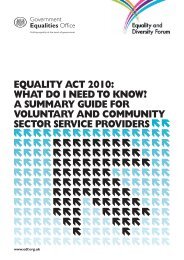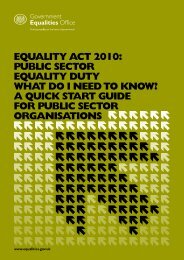A quick start guide to using positive action in recruitment ... - Gov.uk
A quick start guide to using positive action in recruitment ... - Gov.uk
A quick start guide to using positive action in recruitment ... - Gov.uk
Create successful ePaper yourself
Turn your PDF publications into a flip-book with our unique Google optimized e-Paper software.
Example<br />
An employer has very few women <strong>in</strong><br />
its senior management team. Under<br />
the general <strong>positive</strong> <strong>action</strong> provisions it<br />
offers a development programme which<br />
is only open <strong>to</strong> women <strong>to</strong> help female<br />
staff compete for management positions.<br />
This is not unlawful discrim<strong>in</strong>ation<br />
aga<strong>in</strong>st male staff, because it is allowed<br />
by the <strong>positive</strong> <strong>action</strong> provisions.<br />
Positive <strong>action</strong> is entirely voluntary – there<br />
is no requirement for an employer <strong>to</strong> use<br />
either the general provisions or those<br />
relat<strong>in</strong>g <strong>to</strong> <strong>recruitment</strong> and promotion.<br />
What is <strong>positive</strong> <strong>action</strong> when<br />
it applies <strong>to</strong> <strong>recruitment</strong> and<br />
promotion<br />
The new <strong>positive</strong> <strong>action</strong> provisions mean that it<br />
is not unlawful <strong>to</strong> recruit or promote a candidate<br />
who is of equal merit <strong>to</strong> another candidate, if the<br />
employer reasonably th<strong>in</strong>ks the candidate:<br />
• has a protected characteristic that is underrepresented<br />
<strong>in</strong> the workforce; or<br />
• that people with that characteristic suffer a<br />
disadvantage connected <strong>to</strong> that characteristic.<br />
Example<br />
A bank has a vacancy for one of its<br />
senior jobs.All the other senior jobs at<br />
that level are done by men.The bank<br />
conducts a <strong>recruitment</strong> exercise and<br />
at the end of a str<strong>in</strong>gent and objective<br />
process f<strong>in</strong>ds that two applicants – a<br />
man and a woman – could do the job<br />
equally well.The bank could decide <strong>to</strong><br />
take <strong>positive</strong> <strong>action</strong> and give the job<br />
<strong>to</strong> the woman. But the bank couldn’t<br />
give the job <strong>to</strong> the woman if the man<br />
would be able <strong>to</strong> do the job better than<br />
her – that would be unlawful direct<br />
discrim<strong>in</strong>ation aga<strong>in</strong>st the man.<br />
What has changed<br />
Current <strong>positive</strong> <strong>action</strong> provisions <strong>in</strong> employment<br />
relate <strong>to</strong> tra<strong>in</strong><strong>in</strong>g or encouragement – such as<br />
men<strong>to</strong>r<strong>in</strong>g schemes for ethnic m<strong>in</strong>ority staff where<br />
they are under-represented <strong>in</strong> senior roles, or<br />
open days <strong>to</strong> encourage women applicants <strong>in</strong><br />
male-dom<strong>in</strong>ated sec<strong>to</strong>rs.The exist<strong>in</strong>g forms of<br />
<strong>positive</strong> <strong>action</strong> cannot be used as part of the actual<br />
appo<strong>in</strong>tment process.<br />
The Act conta<strong>in</strong>s new provisions <strong>to</strong> allow <strong>positive</strong><br />
<strong>action</strong> specifically <strong>in</strong> the process of <strong>recruitment</strong> and<br />
promotion, <strong>in</strong> limited circumstances.<br />
However, <strong>positive</strong> <strong>action</strong> does not allow an<br />
employer <strong>to</strong> appo<strong>in</strong>t a less suitable candidate<br />
just because that candidate has a protected<br />
characteristic that is under-represented or<br />
disadvantaged.<br />
4







